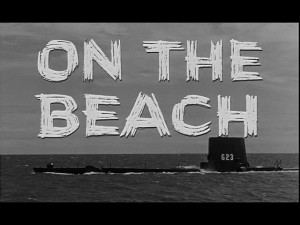 A Nevil Shute-like sci-fi or cli-fi novel about climate change could change the world and possibly even change the political climate that makes acting on climate issues so difficult. And not just a novel with the power of 1957’s “On the Beach,” but a novel that would be turned into a movie as well.
A Nevil Shute-like sci-fi or cli-fi novel about climate change could change the world and possibly even change the political climate that makes acting on climate issues so difficult. And not just a novel with the power of 1957’s “On the Beach,” but a novel that would be turned into a movie as well.
Call it sci fi, cli fi, speculative fiction, fantasy, whatever. Even literary fiction. The label won’t matter, but the content could.
Think about it: What if there was a “Nevil Shute Literary Award for Near Future Climate Novels” that was offering a US $1 million purse for a powerful climate-themed novel written by any novelist, female or male, in any country and in any language. In any genre, ebook or paperback.
First of all, people would ask the organizers: Where are you going to get the money for this prize, to the tune of US $1,000,000? One could imagine the organizers actively canvassing wealthy individuals who made their money in Silicon Valley tech industries or Manhattan media industries to provide seed money for this award, including such angel investors as the founders of Google, Yahoo, PayPal, Ebay, Telsa and others.
The money will come. If you build it, they will come.
At this point in human history, a sci fi or fantasy novel that explores the human and emotional implications and ramifications of global warming and climate change in a wake up call /alarm bell kind of way will go a long way towards awakening humanity to the issues facing the world in the 21st century as we plow along toward the 22nd century. Call the the fate that awaits us now “mutally-assured destruction” (MAD) but “climate-assured destruction (CAD).
What Nevil Shute’s 1957 novel “On the Beach” did for public awareness worldwide of nuclear war and nuclear winter issues is what the The Nevil Shute Literary Award for Climate Novels could be all about. We readers of fiction might find that person or persons who want to write this kind of wake up call novel set in the present or near future in any country on Earth, not just English-speaking ones.
By naming the prize after the famous 1957 book by British-Australian Shute, the award, if it was to materialize, would honor Australia and Mr. Shute while at the same time issuing a global call for such a novel. Who will write it? Stay tuned.
Someone is most likely writing an early draft of her novel right now, his novel, their novel. Outlining it, writing a first chapter or so, putting it through its paces as it morphs from a mere idea and vision into a full-fledged novel, expansive and highly readable. And with a warning to the world embedded in its pages.
“Sometimes, fiction is the best way to win friends and influence people– H. G. Wells’ The Time Machine and George Orwell’s classic, 1984 come to mind,” novelist John Atcheson, who worked on climate issues in the Clinton administration, told me. “Each provoked a visceral reaction that galvanized the culture around it, changing forever the way issues such as class and totalitarianism were perceived. Shute’s On the Beach made the consequences of nuclear war real, and therefore, unthinkable.”
“In a scientifically illiterate culture such as ours, these kinds of myth-based meta-narratives may be the best way to communicate complex scientific issues like climate change,” he added. “Myths, as Bill Moyers and Joseph Campbell revealed, are not necessarily false, nor are they automatically at odds with science. At their best, they provide another way of viscerally experiencing a truth.”
“A spate of novels and movies that feature climate change as either an overt part of the story-line, or an implicit backdrop against which mythical heroes strive may be creating the critical mass for a cultural awakening that allows climate change to be perceived at that pre-rational level–the kind of limbic awareness that motivates change,” he said. “Or so we can hope.”
Or so one can hope.

































A book and perhaps a movie like “On the Beach” would be absolutely perfect. From a scientific perspective, “On the Beach” is laughably inaccurate. The very fact that a sub can safely sail into the alleged nuclear wasteland of the northern hemisphere illustrates the point. What a few yards of water could do, block that deadly radiation, a few yards of concrete could do equally well. During the film’s long wait, there was plenty of time for those in Australia to prepare a refugee for at least a few hundred thousand people. If some were willing to deal with an increased risk of cancer, millions could be protected.
As hysterias go, global warming is particularly ridiculous. Over time, radiation can kill even at moderate levels. The average temperature rises global warming alarmists are talking about over the next century are of absolutely no risk over any time frame. Our bodies simply sweat a little more or less. Excess cold, as in winter, is actually more lethal for the vulnerable than excessive heat, so milder winters and hotter summers actually mean fewer deaths from climate.
This is so silly. Even the most extreme estimates of temperature rise over the next century, say 5 degrees or so, are only about a quarter of the difference in temperature between breakfast and lunch even in cities with mild climates such as Seattle. What we adapt to with ease and almost without thinking about isn’t something that places our lives in mortal danger. Heck, if there’s something we humans are great at, it’s adapting to climate change. We live everywhere from the tropics to the arctic.
I’ve never understood this madness. For a bit over a century we’ve had wave after wave of the scientific hysterias: the yellow peril, race suicide, eugenics, the menace of the feeble-minded, the need for a command economy (Marxist or Nazi) because capitalism had failed, the population bomb, resource depletion, peak oil, and a New Ice Age. Some got attention and some didn’t. But all proved totally, utterly wrong. And the only one that’s really something to get alarmed about would be a a serious cooling trend, cutting growing seasons and threatening food supplies. And the New Ice age hysteria actually got the least attention.
And yet each time one rolls to the top of the hysteria list, the scientific community grabs for grant money, the controllers grope for excuses to push people around, the media outlets trumpet it to sell eyeballs to advertisers, and the easily excited fall for it and take it up as a cause.
Oh, and by the way, in his last novels Michael Crichton was debunking this warming hysteria. That’s an author I respect. I’ll spare you my opinion of Neil Shutes.
–Michael W. Perry, editor of Eugenics and Other Evils by G. K. Chesterton (about one of the earlier hysterias)
Climate change sceptics are already adept at dealing with and refuting fictions. One more is not going to make any difference.
A complex global problem like climate change has to be fought on many fronts, including fiction. Writers and artists, musicians and filmmakers, on and on whatever your specialty or hobby, we ALL need to get involved by sharing our special talents.
Climate change skeptics are the most boring and tedious people. They’re even more boring than David Cameron. Mr. Bloom’s article is about art, not science! For good or ill, On The Beach was frightening because it showed a possible future that no one wants. In the 1980s, the TV series The Day After convinced a generation of Americans that nuclear war was unthinkable, despite neo-cons in the Reagan Administration who seriously believed survival after a nuclear holocaust wouldn’t be half-bad. It’s only a matter of time before a writer or filmmaker creates a work that tips the balance from complacency about climate change to the kind of raw fear that leads to a serious response.
I have written a couple of climate fiction science fiction novels (available as free PDF files on my blog). I agree that there should be more.
For one, like in the book mentioned in the post above, there should be some fiction on the misery to be expected from global warming. Most people just don’t get what is supposed to be such a big deal about a few degrees of warming.
But such a novel should also try to explain a possible solution.
When I was a teenager the people who are now preaching about “”Global Warming”” where telling us about the coming “Ice Age” with glaciers in New York by the 1990s. The earth has no set temperature.
Well, here is the latest positive development. Mayor Michael Bloomberg has just been appointed by the United Nations as special envoy for cities and climate change. Doing something about climate changed happens to have been one of his pet projects and this will give him a world-wide audience ( and he will, of course, be able to pay his own way.)
When I was a teenager the people preaching about “Global Warming” were screaming about the coming “Ice Age” and glaciers in New York by the 1990s. Any more posts like this and TeleRead will be deleted from my bookmarks.
Been done as a movie. Ava Gardner, Gregory Peck. http://www.imdb.com/title/tt0053137/
Human activity has no significant effect on global warming.
Discover the cause of the warming, the end of it, and why temperatures are headed down.
Two primary drivers of average global temperatures explain the reported up and down measurements since before 1900 with 90% accuracy and provide credible estimates back to the low temperatures of the Little Ice Age (1610).
CO2 change is NOT one of the drivers.
The drivers are given at http://agwunveiled.blogspot.com/ which includes eye opening graphs and a plethora of links and sub-links to credible data sources.
Kim Stanley Robinson’s ‘Science in the Capital’ books are the most criminally underappreciated speculative works about climate change already out there waiting for an audience.
t
Dan Bloom is so right. Literature can and does change perceptions in important ways. Look at Dickens, Beecher Stowe, Charles Kingsley. CliFi will help move things along together with Science and common sense.
Please take a look at my own novels – Swamplands and Icarus Rising – both available from Amazon Kindle right now.
Dominic Carney
For this post, I am not interested in the Global Warming Debate. What I am interested in is encouraging writers to write propaganda disguised as novels. If an author wishes to write a novel about climate change, then more power to them (Indeed, I thought I read here, or some other e-reading blog about cli-fi as an emerging sub-genre of science fiction (Though the piece tried to claim it as a totally separate genre)). But one of the wonderful things about novels (and shorter fiction as well) is that it leaves a much wider latitude for author to explore their ideas than television or movies (with their need for much larger audiences) ever could. The last thing I want to see is literary awards than encourage authors to squelch their individual vision in order to compete for some award whose only purpose is to push a particular agenda (regardless of its validity).
I am also not sure that such propaganda would even be effective in the 21st century. In the 19th and early 20th century there really was no competing media. Now television, movies, video games, etc. all compete for the consumer’s attention. Even if the novel is turned into a movie, it is hard to see it having a great impact on people’s perceptions. Climate change, regardless of its origin takes place over decades. It would be hard to make a movie that is both accessible to the general public and at the same time present a picture that is realistic.
Finally a nitpick. It has been decades since I read “On the Beach” but I can’t recall it dealing with Nuclear Winter. Indeed it would be remarkable if it did since scientists did not start doing serious science on it until the 1980s.
@MarylandBill re ”I am also not sure that such propaganda would even be effective in the 21st century. In the 19th and early 20th century there really was no competing media. Now television, movies, video games, etc. all compete for the consumer’s attention. Even if the novel is turned into a movie, it is hard to see it having a great impact on people’s perceptions.”
REPLY: This is a good point, In 1957, there were just a few TV channels and no internet or social media distractions or 500-channel TV cable platforms. As you say so well, no competing media. Even if a blockbuster novel came out about climate, as this prize envisions, it would not change the debate at all, since there is too much competing media to make the theme stick. Even if it was great literature, it would not reach anyone. The novel as wake up call is dead. You said it, sir.